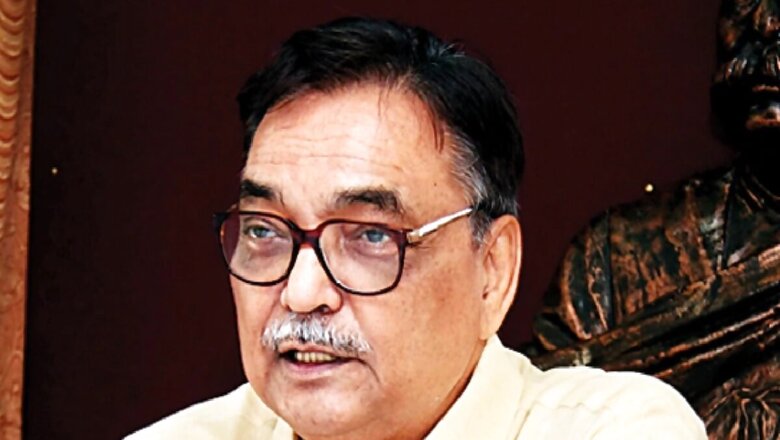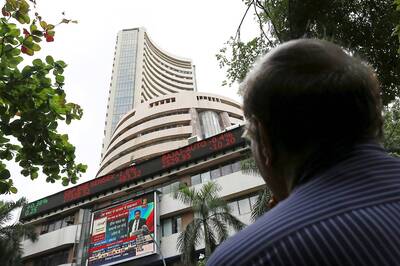
views
In 1980, after a fall in onion prices due to an export ban, Sharad Joshi (45), burst on to the political scene by mobilising farmers to block the busy Pune-Nashik highway at Chakan in protest. The agitation, which continued for days, and also saw villagers holdup traffic with their bullock carts, led to tremors in Delhi. The government declared that the National Agricultural Cooperative Marketing Federation of India (NAFED) would purchase onions.
Earlier, in March 1978, Joshi had similarly mobilised farmers against depressed onion prices due to an export ban. This agitation led to the Shetkari Sanghatana being launched on 8 August 1979. Joshi, an Indian Postal Service official who worked at the Universal Postal Union in Switzerland, had returned to India to become a farmer and get a first-hand understanding of problems in agriculture.
In January 1977, he bought 23.5 acre of rain-fed land at Ambethan near Pune, renamed it ‘Angarmala’ based on a poem by Marathi poet V.V. Shirwadkar ‘Kusumagraj,’ and started farming. As his associates recall, Joshi, a former lecturer in economics and a devotee of free-market economist Adam Smith, wanted to experience dry-land farming as he felt that poverty in India could not be eradicated without bettering the lot of rain-fed farmers.
According to him, the roots of poverty and impoverishment in India lay in the lack of remunerative returns in farming. The realisation about farming being an uncertain occupation dawned on Joshi soon. Upset at being forced to sell his onion crop at prices lower than the cost of production, Joshi advertised in a newspaper asking people to take onions from his farm for free.
After the Chakan protest, farmers who cultivated crops like cotton, sugarcane, tobacco and onions, coalesced around Joshi. The Shetkari Sanghatana received wide-spread support from farmers despite the attempts of some politicians from the dominant Maratha community to weaponise Joshi’s Brahmin origins against him.
A prolific writer in English and Marathi, Joshi gave an economic paradigm to agriculture, arguing for the right of the farmers to determine the prices of their produce. The Sanghatana and its political arm, the Swatantra Bharat Paksha (SBP), which was pitched as the ideological successor of the Swatantra Party, sought greater economic freedom for farmers based on access to markets and technologies like BT modified seeds.
While bringing these issues into the mainstream discourse, the liberal farmer movement advocated a free market, sans any interventions by the government. Joshi welcomed the Dunkel draft and the General Agreement on Tariffs and Trade (GATT) and hailed Arthur Dunkel as a ‘liberator’ of farmers.
This was a bold departure from the prevailing intellectual order of the day, which stressed allegiance to Leftist, socialist or Nehruvian economics and their models of over-arching statism. However, some of his former associates gradually came around to the opinion that the concept of an open market, free of any intervention by the state was a mirage.
Government intervention in agricultural markets was necessary in times of a slump and the Shetkari Sanghatana itself had sought such measures like loan waivers.
Joshi birthed slogans and terminologies which resonate in political lexicon even today. For instance, India vs Bharat (to denote the economic and cultural divide between urban and rural parts of the country), ‘bheek nako, have ghamache daam’ (we farmers don’t want alms, but the fruits of our labour) and ‘sarkar kya samasya sulzhayegi, sarkar khud ek samasya hai!’ (the government can’t solve problems, it is a part of the problem).
With his protest for tobacco farmers in Karnataka and collaboration with Bhupinder Singh Mann of the Bharati Kisan Union and Mahendra Singh Tikait in the 1980s, Joshi emerged as a pan-India farmer leader. Nationalist Congress Party (NCP) president Sharad Pawar recalled that when he went to Punjab as the agriculture minister during the UPA regime (2004-2014), he was often confused with his namesake Sharad Joshi!
One of the major demands of the Shetkari Sanghatana was shattering the monopoly of the Agriculture Produce Market Committees (APMCs) in Maharashtra and doing away with the Essential Commodities Act. It also pointed to a major dichotomy—the farmer was the only producer who was unable to determine the price of his produce, shackled as he was by statist interventions. The organisation’s agitations ensured that restrictive regulations like those compelling farmers to sell their sugarcane to mills in a certain geographical zone, were removed.
As the Centre controversially bulldozed the Farmers’ Produce Trade and Commerce (Promotion and Facilitation) Bill, Farmers (Empowerment and Protection) Agreement of Price Assurance and Farm Services Bill, and Essential Commodities (Amendment) Bill in Parliament, Joshi’s supporters assert this is the culmination of the movement started by the Sanghatana.
While farmers in Punjab and Haryana are protesting against these laws, the Shetkari Sanghatana will celebrate the passage of these legislations, which they claim will do away with the present exploitative regime and give peasants an additional channel to sell their produce.
However, the Shetkari Sanghatana is a pale shadow of its former self, a long cry from the days when its activists with the trademark red badges on their chest and economic ideology of Joshi saheb on their lips, were a common feature in rural areas. Reacting to the passage of these bills, some of Joshi’s erstwhile comrades like Vijay Javandhia and former Lok Sabha MP Raju Shetti, have pointed to concerns about a takeover of agriculture by big business and fears of the MSP regime being dismantled.
But, even staunch supporters of Joshi and the Sanghatana’s ethos admit that despite his support for reforms, their leader, who passed away in 2015, would have been upset at the way in which these legislations were bulldozed by the government in Parliament.
Joshi, who was a Rajya Sabha MP (2004-10) elected with support from the Bharatiya Janata Party (BJP), was a stickler for Parliamentary convention. In 2007, speaking at an event in Mumbai where the biography of Swatantra Party leader Minoo Masani was launched, Joshi had recalled how he never entered the well of the house.
Even as the Narendra Modi government pushed these three bills through, claiming they would benefit farmers, it also imposed a ban on export of onions, reportedly to pull down prices with an eye on the Bihar assembly elections.
Maharashtra produces an estimated 40 per cent of onions grown in India and Lasalgaon in Nashik is reputed as one of the largest spot markets in Asia. But, despite the export ban, and the consequent fall in prices which have hurt them, protests by farmer groups in the state are largely muted.
The reasons for this drift in Maharashtra’s once-robust farmer movement are not hard to discern. Once lauded by Mahatma Gandhi as a “beehive of workers,” the socio-political movements in the state have either been broken by the system or co-opted by the mainstream. Many of Joshi’s followers have either floated their own fronts or fallen in with established parties, thus weakening the larger peasant struggle.
So, even while the prices of onions in Maharashtra continue to head south, farmers rue that there is no organised pushback to the move. A far cry from the days when the falling rates of the humble vegetable led to a former civil servant catalysing a mass movement.



















Comments
0 comment